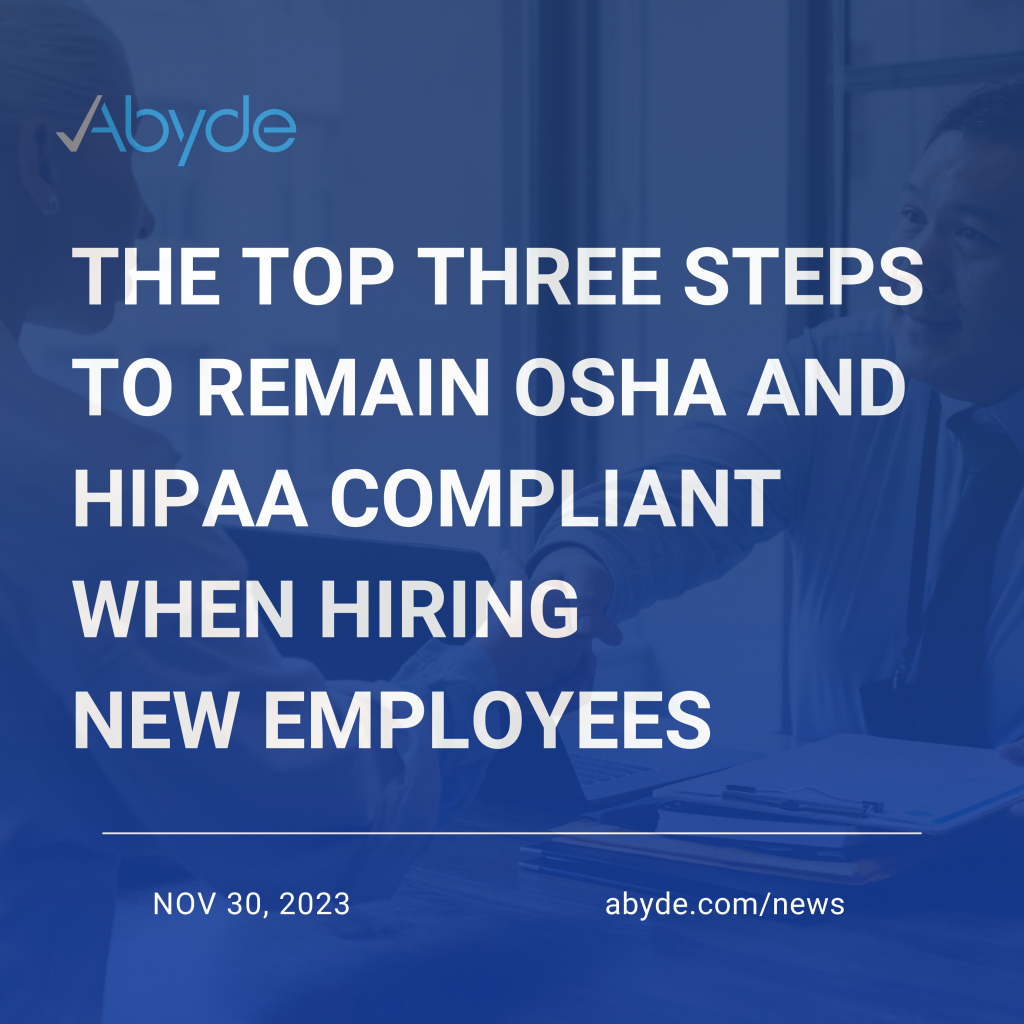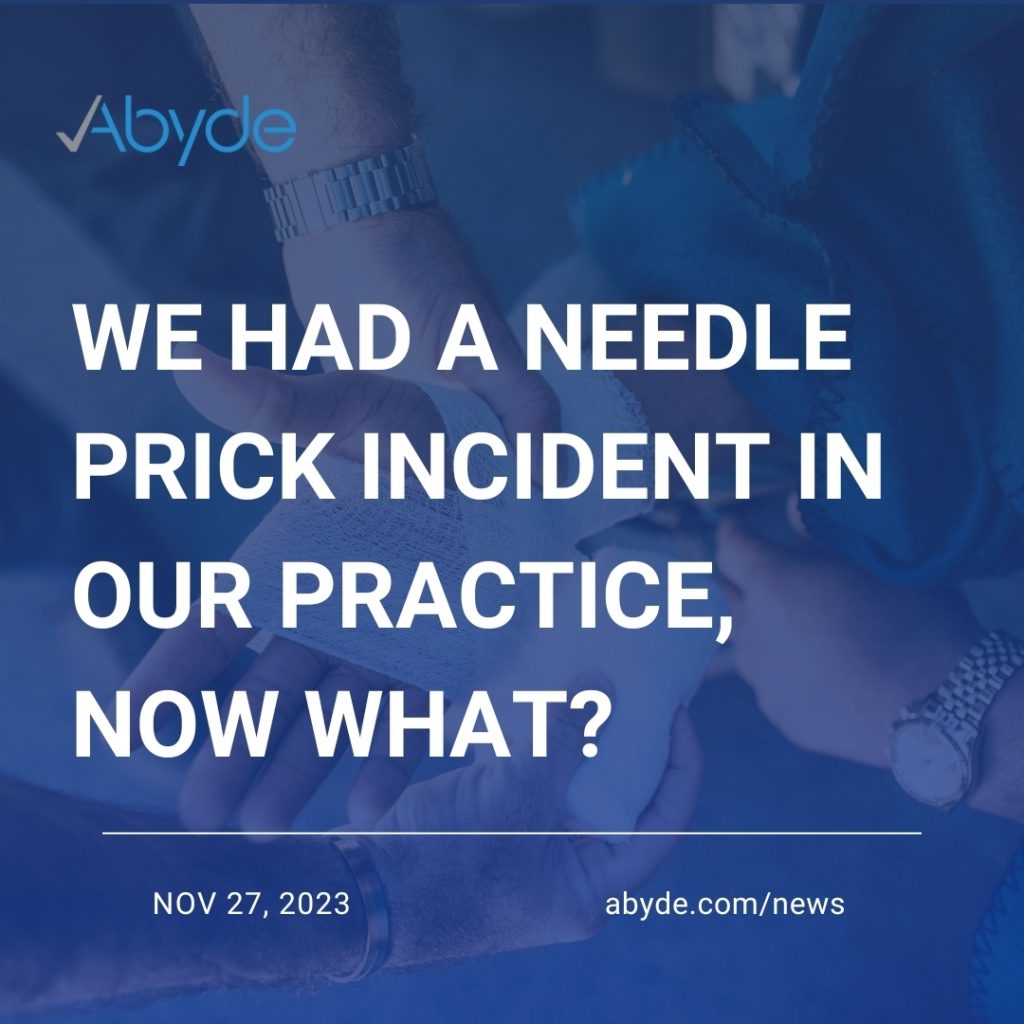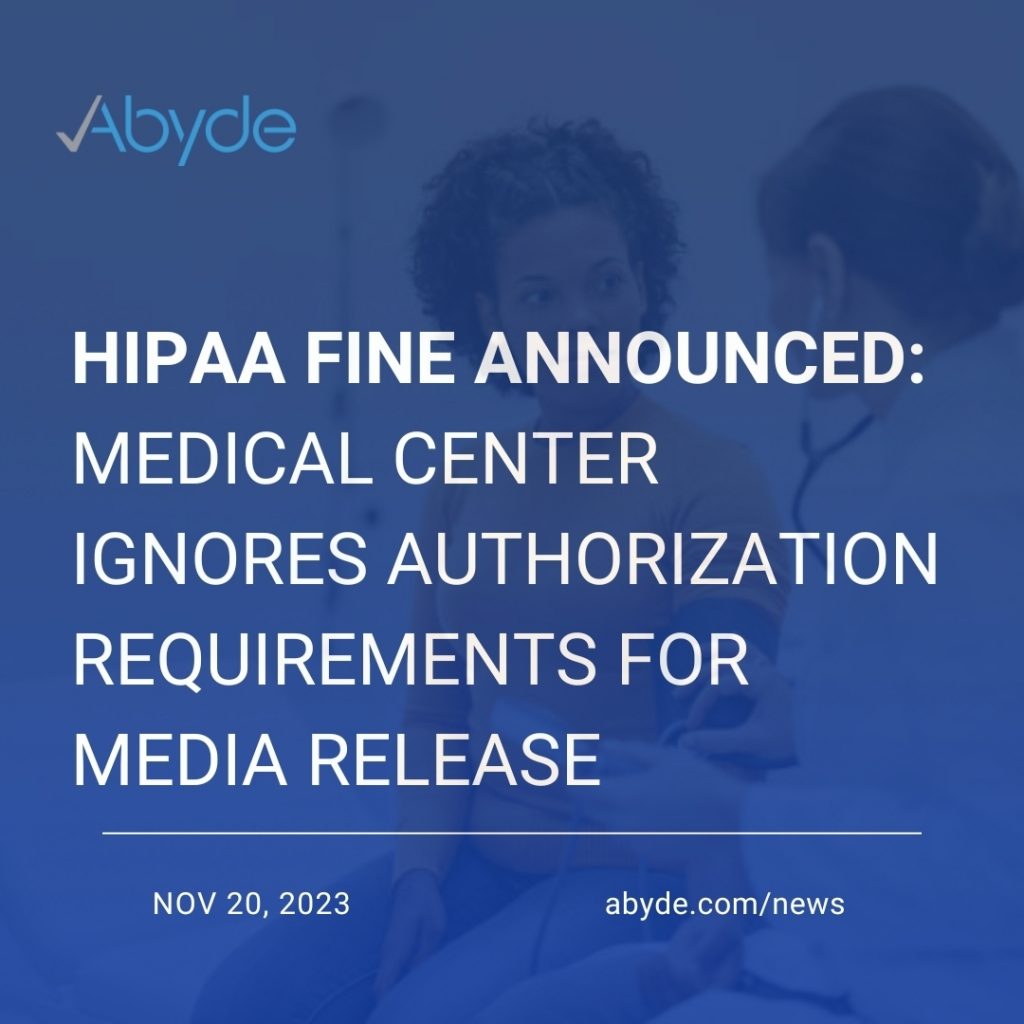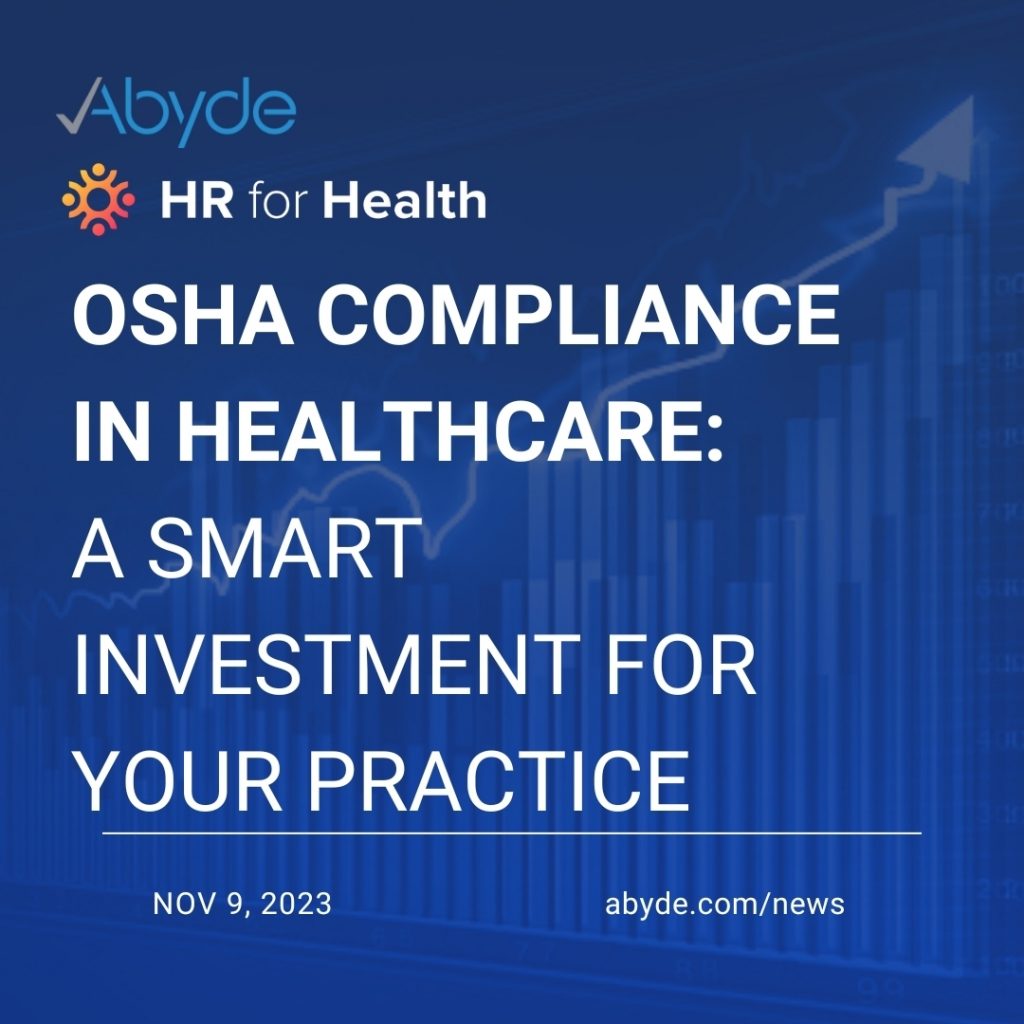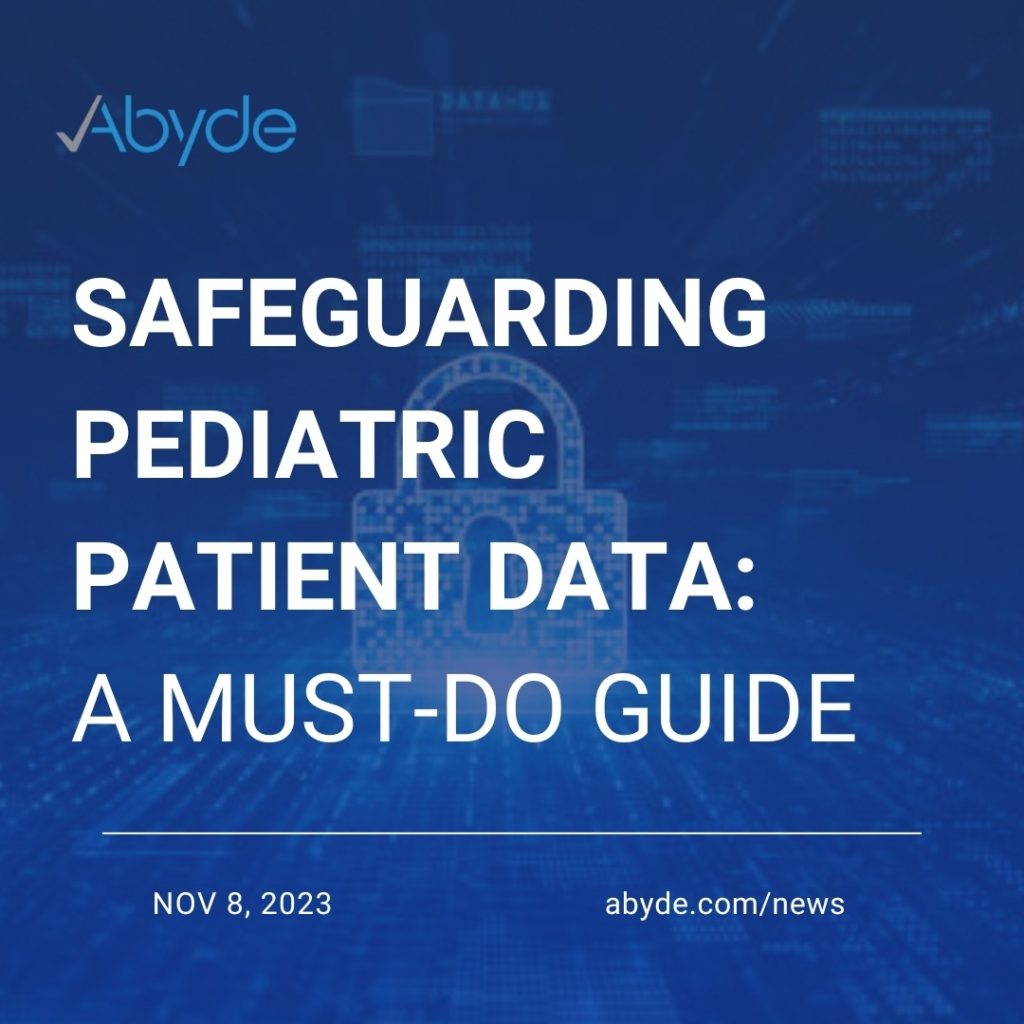November 30, 2023 In the fast-paced realm of healthcare, where patient confidentiality and workplace safety are paramount, hiring new staff demands meticulous attention to HIPAA and OSHA compliance. From the moment a new employee steps through the door, it’s crucial to instill a culture of compliance. Here’s a breakdown of the top three steps a medical practice should take during the onboarding process to ensure their team members are well-versed in compliance. 1. Training: The Foundation of Compliance Training is the bedrock of a compliant workforce. Before the employee even starts to perform job duties, invest time and resources in comprehensive training sessions that focus on both HIPAA and OSHA regulations. Abyde’s employee training portal can guide the creation of tailored training materials, ensuring that employees receive relevant, up-to-date information. Ensure that the training covers the nuances of patient privacy, proper handling of medical records, and the essential safety protocols mandated by OSHA. This also includes making sure employees who work with specialized equipment like X-ray machines, MRIs and lasers are trained specifically on each device. Regular updates and refresher courses can be facilitated through Abyde’s user-friendly employee portal, maintaining a continuous learning environment. 2. Confidentiality Agreements: Protecting Patient Privacy Securing patient information is at the core of HIPAA compliance. Implementing confidentiality agreements is a vital step in ensuring that new hires understand the gravity of safeguarding sensitive data. Clearly outline expectations regarding the handling of patient records, communication protocols, and consequences for breaches. Abyde can assist in streamlining this process by providing dynamically generated confidentiality agreements. Once signed, these agreements should be securely stored and easily accessible for future reference, ensuring that both parties are held accountable. 3. Access to Policies and Procedures: Empowering Informed Decision-Making Granting new employees easy access to your organization’s policies and procedures is essential for fostering informed decision-making. Abyde’s platform facilitates seamless accessibility, allowing employees to review and familiarize themselves with compliance guidelines at their own pace. This access is not only crucial during the onboarding process but should be an ongoing resource. Regular updates to policies and procedures can be effortlessly communicated through Abyde’s platform, ensuring that your team remains aligned with the latest compliance standards. In conclusion, successfully onboarding a new employee in a medical practice requires a strategic approach to compliance. By prioritizing training, confidentiality agreements, and access to policies and procedures, organizations can create a robust foundation for a compliant and secure workplace. Abyde’s innovative solutions streamline these processes, empowering medical practices to navigate the complexities of HIPAA and OSHA compliance with confidence.Interested in seeing the Abyde solution in action? Click here to schedule a demo or call us at 1800-594-0883.
We Had a Needle Prick Incident in Our Practice, Now What?
November 27, 2023 Accidents happen, and in a medical setting, a needle prick can be a cause for concern. As a responsible healthcare provider, it’s crucial to have a clear protocol in place for your team to follow when such incidents occur. In this guide, we’ll walk you through the top four things your medical practice must do after a needle prick to ensure the well-being of your staff and maintain compliance. 1. Provide First Aid to the Employee If Needed: The safety and well-being of your staff are paramount. In the event of a needle prick, provide immediate first aid to the affected employee. Ensure that basic first aid supplies are readily available, and educate your team on the proper procedures to address minor injuries. Quick and appropriate action can significantly reduce the risk of complications. 2. Recommend the Employee Seek Medical Attention: While first aid is a crucial initial step, it’s essential to recommend that the affected employee seek professional medical attention promptly. Urgent care facilities or other medical providers can conduct a thorough assessment of the situation and determine if further medical interventions, such as post-exposure prophylaxis (PEP), are necessary. Prompt medical attention is vital for minimizing potential health risks. 3. Ask the Source Patient for Consent to Test Their Blood: One of the critical steps after a needle prick is to assess the risk of bloodborne pathogens. Seeking consent from the source patient for blood testing is a crucial component of this assessment. Utilize the Accidental Exposure Testing Consent Form provided by Abyde to ensure that the process is well-documented and compliant. This form not only demonstrates your commitment to employee health but also facilitates a transparent and legally sound approach to managing potential exposures. 4. Log Incident within Abyde: To maintain a comprehensive record of the incident and demonstrate compliance with industry standards, it’s imperative to log the needle prick incident within Abyde. Abyde’s robust compliance solutions are designed to streamline documentation processes and ensure that all necessary details are recorded accurately. By logging the incident promptly, you create a valuable resource for future reference, audits, and continuous improvement of your workplace safety protocols. Conclusion: Prioritizing Safety and Compliance Handling a needle prick incident promptly and responsibly is crucial for the safety of your staff and the integrity of your medical practice. By providing immediate first aid, recommending professional medical attention, seeking consent for blood testing, and logging the incident within Abyde, you establish a robust framework for managing such situations. Abyde’s commitment to simplifying compliance processes ensures that your medical practice can navigate post-needle prick protocols seamlessly. Remember, proactive measures today contribute to a safer and more compliant healthcare environment tomorrow. Not yet using Abyde? Click here to schedule a one-on-one consultation with a compliance expert!
HIPAA Fine Announced: Medical Center Ignores Authorization Requirements for Media Release
November 20, 2023 In recent news, the U.S. Department of Health and Human Services (HHS), Office for Civil Rights (OCR) settled a HIPAA investigation with Saint Joseph’s Medical Center over the unauthorized disclosure of COVID-19 patients’ protected health information (ePHI) to a national media outlet. This incident underscores a critical lesson in patient privacy, prompting Abyde to emphasize the significance of obtaining patient authorization before releasing any ePHI or images. See, What Had Happened Was Saint Joseph’s Medical Center, a non-profit academic medical center in New York, faced potential violations of the Health Insurance Portability and Accountability Act of 1996 (HIPAA) Privacy Rule. The center improperly disclosed sensitive patient information to a national media outlet without obtaining the necessary written authorization from the patients, leading to a settlement with the OCR. The Importance of Patient Authorization The OCR makes it clear that patients have the right to control the disclosure of their health information. This settlement highlights the need for healthcare providers to prioritize patient authorization before releasing any ePHI or images, particularly to the media. Abyde’s Take When undergoing medical treatment in medical facilities, patients should feel assured that their healthcare providers will not disclose their personal health information to the media without obtaining proper authorization. Abyde cannot stress enough the responsibility of healthcare providers in safeguarding patient privacy. Key Takeaways: Our Final Word The settlement with Saint Joseph’s Medical Center serves as a valuable lesson for healthcare providers everywhere. Abyde remains committed to supporting practices in navigating the complexities of HIPAA compliance, with a specific emphasis on the importance of obtaining patient authorization before disclosing any ePHI or images. To see why Abyde is considered the pre-eminent HIPAA compliance solution, click here to schedule a demo.
OSHA Compliance in Healthcare: A Smart Investment for Your Practice
November 9, 2023 The following blog was co-written with Abyde’s HR partner, HR for Health. If you would like more information on HR for Health, please click here to visit their website. As a practice owner or healthcare employer, it is essential to prioritize the safety and well-being of your employees. One effective way to achieve this is by providing your team with proper Occupational Safety and Health Administration (OSHA) training. However, the cost of such training may deter some employers from investing in it. HR for Health team’s up with compliance partner Abyde to explore the nuances of OSHA training and the benefits of compensating your employees for their time spent training. OSHA in Healthcare: Navigating the Compliance Maze OSHA is a federal agency that’s all about keeping workplaces safe and healthy. In the healthcare world, this translates to ensuring the safety of both employees and patients. OSHA sets the rules, regulations, and guidelines that healthcare providers must follow to maintain a safe working environment. Requirements for Healthcare Providers Healthcare providers must adhere to OSHA regulations to ensure the well-being of everyone in the facility. This involves a multitude of requirements, from infection control to safe handling of hazardous materials, to reducing workplace violence. Compliance with OSHA standards is not just a box to tick; it’s about safeguarding the lives and health of patients and employees. The Crucial Connection to Employee Training and Retention Now, here’s where it gets interesting. Effective training and compliance with OSHA regulations play a pivotal role in employee training and retention. When healthcare providers prioritize OSHA training, they signal a commitment to employee well-being. This commitment, in turn, results in a happier, healthier, and more loyal workforce. Investing in comprehensive OSHA training demonstrates that you value your employees’ safety. This not only creates a positive work culture but also significantly impacts employee retention. Employees who feel secure and well-cared for are more likely to stay with your healthcare practice, reducing turnover rates and the costly process of recruiting and training new staff. Additionally, by equipping your employees with the necessary knowledge and skills to work safely, you can significantly reduce the risk of incidents occurring on the job. Consequently, this can save your company money in the long run, as workplace accidents lead to expensive workers’ compensation claims and lost productivity. The Legal Perspective According to HR for Health, compensating employees for OSHA training is not only a wise business decision but may also be required by law. Under the Fair Labor Standards Act (FLSA), employers must pay employees for their time spent in training directly related to their job duties. Therefore, if you require employees to complete OSHA training as part of their responsibilities, you must compensate them for the time spent in training. On the flip side… Employers may choose to provide a different rate of pay for training, but it’s left up to employers to decide if their training falls under certain criteria to provide a different rate of pay versus their regular rate of pay. These are the criteria points that must be met: It is imperative that you clearly outline the alternate rate of pay in your employee handbook, which cannot be less than minimum wage. How Abyde Keeps You Compliant Abyde, a provider of HIPAA compliance solutions, emphasizes the importance of OSHA training for healthcare organizations. In addition to reducing the risk of workplace accidents, OSHA training helps healthcare providers comply with HIPAA regulations. By ensuring that employees are trained on proper handling and disposal of hazardous materials, healthcare organizations can avoid costly fines and penalties for non-compliance. Abyde’s key features include: For more information on Abyde and how they work with your healthcare practice, please visit abyde. Track Employee Training with HR for Health HR for Health is a comprehensive human resources platform designed specifically for healthcare professionals. Key training tracking features include: In conclusion, compensating employees for OSHA training is a wise investment for employers who prioritize the safety and well-being of their team members. Not only does it help prevent workplace accidents and injuries, but it also boosts employee morale and job satisfaction. As HR for Health and Abyde suggest, employers should be aware of their legal obligations and take steps to ensure that employees are properly compensated for their time spent in training.
Safeguarding Pediatric Patient Data: A Must-Do Guide
November 8, 2023 Imagine a bustling pediatric practice, filled with the laughter of kids. In this lively setting, protecting patient data may not be the first thing on your mind, but it’s as important as ensuring those precious smiles! At Abyde, we’re all about ensuring the well-being of your little patients, and that begins with safeguarding their data. Let’s explore why this is crucial and how compliance and security play a vital role in keeping patient information safe. Why is Pediatric Patient Data So Important? The health records of children are a treasure trove of essential information, from vaccination records to allergies and growth charts. But medical data isn’t the only data that’s valuable – you’re also talking names, dates of birth, addresses and potentially social security numbers. Securing this data is vital to guarantee a healthy future for your young patients. The Compliance Connection So, what’s compliance? Think of it as your guide to data security. Compliance means adhering to rules and regulations, ensuring patient data remains secure. HIPAA (Health Insurance Portability and Accountability Act) is one of these essential rules, setting the standards for protecting sensitive health information. The Role of Security Security acts as the guardian of patient data. It encompasses measures like secure passwords, firewalls, and encryption, shielding data against breaches and unauthorized access. However, there’s a crucial component: proper documentation. Without it, your security measures are like having a shield but no strategy. Documented policies and procedures are your roadmap for keeping data safe, outlining how data is accessed, stored, and shared. It’s More Than Just Locks and Keys Data security isn’t just about digital locks; it’s also about your staff’s training to protect this treasure. Training ensures that they handle patient data responsibly, whether it’s on paper or in a computer. Equally important is your ability to prove that you’re doing everything right. Regular audits and monitoring help you ensure that your data is well-protected. In Conclusion The secret to protecting pediatric patient data involves a blend of compliance, security, documented policies, and well-trained staff. When you get this recipe right, you become a healthcare hero in the pediatric world. Remember, every effort you invest in safeguarding patient data ensures more smiles on those adorable faces. And there’s no better way to implement and sustain mandatory compliance programs than with Abyde—the industry’s easiest and most comprehensive software. With Abyde, you’ll effortlessly manage your compliance needs and keep those little smiles sparkling and secure!
